Published in Nacional number 652, 2008-05-12
Hunt for the Pale gang
Search for the Split robbers
Croatia's heist of the century was organised by a crime ring involved in mob showdowns, forced to flee Bosnia & Herzegovina after one of its leaders, Vlatko Macar, was killed in a car bomb explosion
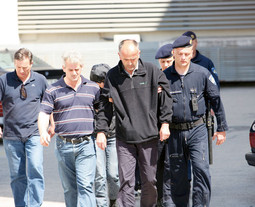 Miroslav Hrsum, a 49-year-old stonemason, is the only member of the Bosnian 'Zdrala Clan' arrested in Split A joint operation by USKOK (Office for the Prevention of Corruption and Organized Crime), the Croatian police and the SOA (Security & Intelligence Agency) has led to the arrests in Split of six persons, remanded to the custody of County Court investigating judge Stanko Grbavac, part of a large international crime ring, suspected of having planned the robbery of the Croatian Post central office in Split and of walking away with 15 million kuna on 15 March 2008. The operation was carried out in collaboration with the Bosnian SIPA and the police forces of Bosnia & Herzegovina and Serbia. Among the arrested persons are Jozo Certa, head of the Kastela HVIDR (an association of disabled Homeland War veterans), the brothers Miro and Emil Cokaric, a boiler operator at the KBC Clinical Hospital in Split, Mladen Stupalo, proprietor of the Vega café bar, Boris Marusic, a security guard with the AKD Company, Vesna Vuco, an employee of the Croatian Post, and Miroslav Hrsum, a 49-year-old stonemason and a member of a powerful crime ring operating in Pale and eastern Sarajevo, led by Dorde Zdrala and the recently murdered mob boss Vladimir Vlatko Macar, one of the three Serbian crime rings operating in the mafia undergrounds of Sarajevo and Belgrade, whose gangland war and showdowns were soon to have found a new setting in Split.
Miroslav Hrsum, a 49-year-old stonemason, is the only member of the Bosnian 'Zdrala Clan' arrested in Split A joint operation by USKOK (Office for the Prevention of Corruption and Organized Crime), the Croatian police and the SOA (Security & Intelligence Agency) has led to the arrests in Split of six persons, remanded to the custody of County Court investigating judge Stanko Grbavac, part of a large international crime ring, suspected of having planned the robbery of the Croatian Post central office in Split and of walking away with 15 million kuna on 15 March 2008. The operation was carried out in collaboration with the Bosnian SIPA and the police forces of Bosnia & Herzegovina and Serbia. Among the arrested persons are Jozo Certa, head of the Kastela HVIDR (an association of disabled Homeland War veterans), the brothers Miro and Emil Cokaric, a boiler operator at the KBC Clinical Hospital in Split, Mladen Stupalo, proprietor of the Vega café bar, Boris Marusic, a security guard with the AKD Company, Vesna Vuco, an employee of the Croatian Post, and Miroslav Hrsum, a 49-year-old stonemason and a member of a powerful crime ring operating in Pale and eastern Sarajevo, led by Dorde Zdrala and the recently murdered mob boss Vladimir Vlatko Macar, one of the three Serbian crime rings operating in the mafia undergrounds of Sarajevo and Belgrade, whose gangland war and showdowns were soon to have found a new setting in Split.
The second Serbian crime ring based in Pale was led by Darko Elez, and the third, based in Sokolac, was led by Mladen Ceha, murdered in June of last year. Hrsum is the only of the persons arrested in Split for which there is a founded suspicion that he played a direct role in big heist of the Croatian Post central office in the Split quarter of Kopilice, and in the robbery of the postal office in Split's Ravne njive, where 95,000 kuna were stolen five months ago. Hrsum only got 1,200 kuna for his part in the robbery of the Ravne njive postal office, but that was just a "warm up", the start of his work with the Split criminal underground in preparation for the "big bang". Local Split "entrepreneurs" and people without police records conceived a plan for a massive heist of postal money and engaged the services of professionals from the Serbian underground in Bosnia & Herzegovina.
The robbery of the postal service's central office was carried out by six citizens of Bosnia & Herzegovina and Serbia, of which five immediately, with a booty of 13.8 million kuna, fled to Pale and Belgrade, while the sixth member, Hrsum remained in Split. 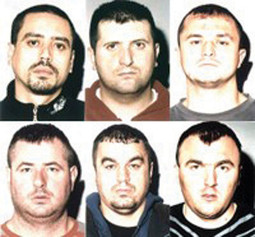 The 15 million kuna heist at the central post office in Split was carried out by members of the 'Zdrala Clan' based in the Republika Srpska An investigation will shed light on the role of Jozo Certa. What is known at the moment is that he made frequent trips to Pale and allegedly maintained regular contacts with the local crime ring. The police suspect him of torching the Grand Cherokee jeep used by the robbers to flee the crime scene on March 22, near the settlement of Lecevice, seven days after the heist. HDZ MP Josip Dakic tried to install Certa two years ago as the head of the HVIDR association in Kastela, in an attempt to oust incident-prone Zeljko Stize from HVIDR headquarters. Certa is the president of the County association of football referees and the athletic director of the NK Val football club of Kastela. The second conspirator in the central post office heist, for which the group of Split robbery amateurs engaged the services of professionals from eastern Sarajevo and Pale, is allegedly 56-year-old Miro Cokaric. He too is alleged to have maintained contacts with the Serbian criminals. Boris Marusic, a security guard with the state-run AKD security service was on duty at the central post office entry and opened the door for the robbers, who had an excellent knowledge of the floor plan of the premises, even the time at which the main postal safe was opened for a bill count.
The 15 million kuna heist at the central post office in Split was carried out by members of the 'Zdrala Clan' based in the Republika Srpska An investigation will shed light on the role of Jozo Certa. What is known at the moment is that he made frequent trips to Pale and allegedly maintained regular contacts with the local crime ring. The police suspect him of torching the Grand Cherokee jeep used by the robbers to flee the crime scene on March 22, near the settlement of Lecevice, seven days after the heist. HDZ MP Josip Dakic tried to install Certa two years ago as the head of the HVIDR association in Kastela, in an attempt to oust incident-prone Zeljko Stize from HVIDR headquarters. Certa is the president of the County association of football referees and the athletic director of the NK Val football club of Kastela. The second conspirator in the central post office heist, for which the group of Split robbery amateurs engaged the services of professionals from eastern Sarajevo and Pale, is allegedly 56-year-old Miro Cokaric. He too is alleged to have maintained contacts with the Serbian criminals. Boris Marusic, a security guard with the state-run AKD security service was on duty at the central post office entry and opened the door for the robbers, who had an excellent knowledge of the floor plan of the premises, even the time at which the main postal safe was opened for a bill count.
Mladen Stupalo, owner of the Vega café bar, worked on the operational preparation of the heist, casing the postal premises with a camera and working out the timing of the robbery, carried out in the space of 20 minutes. The only woman in the gang was Vesna Vuco, a Croatian Post employee who provided information on when and where a certain sum of money would be, for a 30,000 kuna payoff. A million of the stolen kuna, of the 1.2 million kuna retained by the Split group as their cut, was found buried in the tunnel of the boiler room of the Krizine Hospital, one of the two hospital buildings of Split's KBC Clinical Hospital, at the workplace of 49-year-old boiler operator Emil Cokaric.
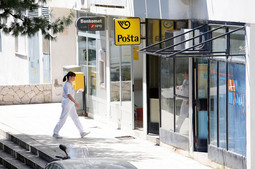 The post office at Ravne njive – the robbers made away with 95 thousand kuna there at the beginning of the year in a rehearsal for the Kopilice heist USKOK's top official Dinko Cvitan and Director General of Police Marijan Benko pointed out in Split that the police had stopped the organised crime ring that had chosen Split as the scene of their robberies and infighting. "Two opposing criminal rings from Serbia and Bosnia & Herzegovina were out to neutralise each other, settling their accounts using terrorist methods, as in the case of the liquidation of a member of a crime ring in Sarajevo", said Benko. And it is, in fact, among the members of the Bosnian Serb crime ring, holders of double citizenship, of Bosnia & Herzegovina and of Serbia, that the story of the big heist in Split starts. A remote-controlled car bomb at a bus station in Pale was used in the brutal murder on 31 January of this year of 31-year-old Vladimir Vlatko Macar, one of the bosses of the criminal underground in eastern Sarajevo. The leader of the Pale criminal ring, known for murder, robbery, drug trafficking, automobile theft and smuggling and racketeering, died when the explosive placed in a stolen VW Golf 2 was activated in front of his café bar Omerta.
The post office at Ravne njive – the robbers made away with 95 thousand kuna there at the beginning of the year in a rehearsal for the Kopilice heist USKOK's top official Dinko Cvitan and Director General of Police Marijan Benko pointed out in Split that the police had stopped the organised crime ring that had chosen Split as the scene of their robberies and infighting. "Two opposing criminal rings from Serbia and Bosnia & Herzegovina were out to neutralise each other, settling their accounts using terrorist methods, as in the case of the liquidation of a member of a crime ring in Sarajevo", said Benko. And it is, in fact, among the members of the Bosnian Serb crime ring, holders of double citizenship, of Bosnia & Herzegovina and of Serbia, that the story of the big heist in Split starts. A remote-controlled car bomb at a bus station in Pale was used in the brutal murder on 31 January of this year of 31-year-old Vladimir Vlatko Macar, one of the bosses of the criminal underground in eastern Sarajevo. The leader of the Pale criminal ring, known for murder, robbery, drug trafficking, automobile theft and smuggling and racketeering, died when the explosive placed in a stolen VW Golf 2 was activated in front of his café bar Omerta.
Macar was killed on the very day he intended to flee Bosnia & Herzegovina. It is unknown whether he meant to escape liquidation or arrest, and whether he, unlike his great rival Darko Elez, had decided to move to Croatia, where his people had tried and managed to locate hiding places and sanctuaries in several towns, including Split. 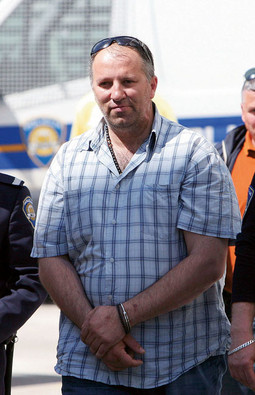 Jozo Certa, the head of the organisation of disabled war veterans in Kastela, was taken, handcuffed, into the custody of Split police investigators Monday Now, when some members of Zdrala's and Macar's clans had been detected in Split after the heists at the post office in Ravne njive and the central post office in Kopilice, Elez's gang intended to liquidate them. The murder of Vlatko Macar was only the latest in a string of bloody showdowns between Serbian criminals in eastern Sarajevo. The liquidations up to then had been carried out by gunning the targets down in their cars or by liquidations carried out in secluded places. The Pale gang was led by Macar and his friend and business partner Dorde Zdrala. The Zdrala-Macar gang went to war in 2006 with a criminal ring led by Darko Elez. In the spring of 2006 an attempt was made at Zdrala's life. It was organised by Elez. The attempted murder of Andelko Veljancic, Elez's right hand man, was carried out not long afterwards. According to the investigation carried out by the Canton Prosecutor's Office in Sarajevo, Veljancic and Elez robbed 2.2 million euro from the Privredna bank of Sarajevo in the summer of 2006. Elez managed to escape to Belgrade. The Public Prosecutor's Office of Bosnia & Herzegovina does not know or does not wish to use the evidence collected against Veljancic. The Zdrala-Elez war moved to Belgrade, where Elez went into hiding in the face of the threats against him. The Serbian police managed to prevent a bloody showdown between the two Pale-based groups.
Jozo Certa, the head of the organisation of disabled war veterans in Kastela, was taken, handcuffed, into the custody of Split police investigators Monday Now, when some members of Zdrala's and Macar's clans had been detected in Split after the heists at the post office in Ravne njive and the central post office in Kopilice, Elez's gang intended to liquidate them. The murder of Vlatko Macar was only the latest in a string of bloody showdowns between Serbian criminals in eastern Sarajevo. The liquidations up to then had been carried out by gunning the targets down in their cars or by liquidations carried out in secluded places. The Pale gang was led by Macar and his friend and business partner Dorde Zdrala. The Zdrala-Macar gang went to war in 2006 with a criminal ring led by Darko Elez. In the spring of 2006 an attempt was made at Zdrala's life. It was organised by Elez. The attempted murder of Andelko Veljancic, Elez's right hand man, was carried out not long afterwards. According to the investigation carried out by the Canton Prosecutor's Office in Sarajevo, Veljancic and Elez robbed 2.2 million euro from the Privredna bank of Sarajevo in the summer of 2006. Elez managed to escape to Belgrade. The Public Prosecutor's Office of Bosnia & Herzegovina does not know or does not wish to use the evidence collected against Veljancic. The Zdrala-Elez war moved to Belgrade, where Elez went into hiding in the face of the threats against him. The Serbian police managed to prevent a bloody showdown between the two Pale-based groups.
Elez then sent a hired assassin from Sremske Kamenice named Strahinjau Raseta to liquidate Dorde Zdrala, but the attempt did not succeed. The Serbian police have issued a warrant for Raseta, allegedly close to the third Serbian crime gang in Sarajevo, the criminal organisation from Sokolac, led by Mladen Ceha, who they suspect took part in the attempt on the life of Goran Mijatovic aka Mita, the owner of Belgrade's Bezanija football club, who was killed in October of 2006 by the explosion of the MRUD mine, placed in the motor of an Audi 80, a hit ordered by the new Belgrade mafia clan led by Dejan Stojanovic Keka.
When Raseta failed to liquidate Elez for Zdrala, Elez in turn, in August of 2007, ordered the murder of Boris Govedarica, a close associate of Macar's and Zdrala's, in front of the Tom shopping mall in the Dobrinja quarter of Sarajevo. Govedarica was killed. Even after two years of investigation against Macar and a dozen other criminals from eastern Sarajevo the Public Prosecutor's Office of Bosnia & Herzegovina has done practically nothing in uncovering and preventing murder, drug trafficking and automobile theft, regardless of the fact that the investigation, at the order of State Prosecutor Bozo Mihajlovic, is being led by members of the State Agency for Investigation & Protection (SIPA), the Sarajevo Canton interior ministry, and the Republika Srpska interior ministry. Republika Srpska police director Uros Pena recently accused the Public Prosecutor's Office of Bosnia & Herzegovina on TV that it, in spite of the evidence collected, has not filed charges against the members of the crime organisations headed by Zdrala, Elez and Ceha. It was thought that Macar was being protected from the police by his influential relative Goran Macar, the post-war head of the crime investigation police at the Republika Srpska interior ministry. He has lived in Belgrade for ten years now and was the deputy director of the Office of Republika Srpska in Belgrade.
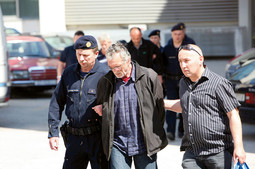 Boris Marusic, a security guard employed by the state run AKD Company, who is alleged to have opened the door of the post office from the inside to let the robbers in He is considered to be close to Serbian businessman Momcilo Mandic. The organisation led by 38-year-old Mladen Ceha has had the worst of it so far. Ceha was gunned down in his Skoda Fabia in June of 2007. In the autumn of that year the Serbian police arrested six criminals from Sokolac, led by Miomir Pajkic Pajko, charging them with the liquidation of Goran Mijatovic the previous year. The Sokolac gang has been led by Ognjen Orasanin Oras since then. Dorde Zdrala has allegedly fled to Australia, even though Elez, who has been in Belgrade for a year and half, is looking for him in Croatia. Mladen Ceha, Vlatko Macar, Srdan Duric and Boris Govedarica have been murdered. An Elez man, Slavisa Bilinac Bila, who collaborated with the Sokolac gang, has disappeared. The robbery of the central post office in Split has revealed a lot more than a massive sum of stolen money. Almost 14 million kuna, about 2 million euro of Croatian money, has ended up in Bosnia & Herzegovina and Serbia. Zoran Stefanovic tried to exchange about 350,000 kuna at the "Arizona" market near Brcko.
Boris Marusic, a security guard employed by the state run AKD Company, who is alleged to have opened the door of the post office from the inside to let the robbers in He is considered to be close to Serbian businessman Momcilo Mandic. The organisation led by 38-year-old Mladen Ceha has had the worst of it so far. Ceha was gunned down in his Skoda Fabia in June of 2007. In the autumn of that year the Serbian police arrested six criminals from Sokolac, led by Miomir Pajkic Pajko, charging them with the liquidation of Goran Mijatovic the previous year. The Sokolac gang has been led by Ognjen Orasanin Oras since then. Dorde Zdrala has allegedly fled to Australia, even though Elez, who has been in Belgrade for a year and half, is looking for him in Croatia. Mladen Ceha, Vlatko Macar, Srdan Duric and Boris Govedarica have been murdered. An Elez man, Slavisa Bilinac Bila, who collaborated with the Sokolac gang, has disappeared. The robbery of the central post office in Split has revealed a lot more than a massive sum of stolen money. Almost 14 million kuna, about 2 million euro of Croatian money, has ended up in Bosnia & Herzegovina and Serbia. Zoran Stefanovic tried to exchange about 350,000 kuna at the "Arizona" market near Brcko.
It is evident that a new generation of criminals, mutually connected, has come of age in all of the countries on the territory of the former Yugoslavia. Young people, who did not take part in the war, are becoming brutal and unscrupulous mafia bosses, who want to expand their operations and territory to Croatia. The Serbian and Bosnian police, SIPA and other agencies, have narrowed the space in which they are able to operate. Croatia is welcome as a hiding place and sanctuary, but also as a stage for new grand heists and showdowns. The Croatian police, in collaboration with the police forces of neighbouring countries, must prevent them from doing so.
Related articles
William Montgomery as key strategist of the offensive against the Dubrovnik mafia
William Montgomery as key strategist of the offensive against the Dubrovnik mafia BACKGROUND OF THE 'FIVE STARS' AFFAIR Nacional reveals how Strok's… Više
Latest news
-
28.10.2010. / 14:15
'A profitable INA is in everyone's interest'
-
28.10.2010. / 09:38
Sanader’s eight fear SDP — Won’t bring down Government
-
21.10.2010. / 15:02
Interior Ministry turned a blind eye on Pukanic assassination
-
20.10.2010. / 09:34
Barisic could bankrupt HDZ




